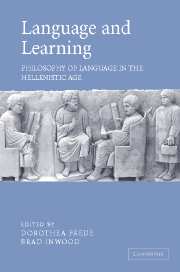Book contents
- Frontmatter
- Contents
- List of contributors
- Preface
- List of abbreviations
- Introduction
- 1 The Stoics on the origin of language and the foundations of etymology
- 2 Stoic linguistics, Plato's Cratylus, and Augustine's De dialectica
- 3 Epicurus and his predecessors on the origin of language
- 4 Lucretius on what language is not
- 5 Communicating Cynicism: Diogenes' gangsta rap
- 6 Common sense: concepts, definition and meaning in and out of the Stoa
- 7 Varro's anti-analogist
- 8 The Stoics on fallacies of equivocation
- 9 What is a disjunction?
- 10 Theories of language in the Hellenistic age and in the twelfth and thirteenth centuries
- References
- Index nominum et rerum
- Index locorum
9 - What is a disjunction?
Published online by Cambridge University Press: 23 November 2009
- Frontmatter
- Contents
- List of contributors
- Preface
- List of abbreviations
- Introduction
- 1 The Stoics on the origin of language and the foundations of etymology
- 2 Stoic linguistics, Plato's Cratylus, and Augustine's De dialectica
- 3 Epicurus and his predecessors on the origin of language
- 4 Lucretius on what language is not
- 5 Communicating Cynicism: Diogenes' gangsta rap
- 6 Common sense: concepts, definition and meaning in and out of the Stoa
- 7 Varro's anti-analogist
- 8 The Stoics on fallacies of equivocation
- 9 What is a disjunction?
- 10 Theories of language in the Hellenistic age and in the twelfth and thirteenth centuries
- References
- Index nominum et rerum
- Index locorum
Summary
Stoic logicians attended to words rather than to things: so claimed Galen, a dozen times or more; and so claimed Alexander of Aphrodisias. Galen and Alexander meant the claim as an accusation and a criticism: it was because they thought not of things but of words, that the Stoics made fundamental errors in their logic.
Nineteenth-century historians of logic echoed the ancient claim, and they too thought that Stoic logic was ruined by its passion for words. Twentieth-century historians of logic also echoed the ancient claim. But for them it was not a criticism. On the contrary, it was a sign that the Stoic logicians were ‘formalists’ – and it is good thing for a logician to be a formalist.
But whether it is bad or good to attend to words rather than to things can scarcely be decided until we know what it means to attend to words rather than to things. In the following pages I shall discuss one or two aspects of the ancient claim and one or two of the texts pertinent to it. The texts concern complex propositions – conditionals, conjunctions, disjunctions. Such items form the foundations of Stoic logic. According to Galen and Alexander, the Stoics made fundamental errors about these fundamental items: they did so because they attended to words rather than to things, because their misdirected gaze encouraged them to misclassify compound propositions.
- Type
- Chapter
- Information
- Language and LearningPhilosophy of Language in the Hellenistic Age, pp. 274 - 298Publisher: Cambridge University PressPrint publication year: 2005
- 1
- Cited by

